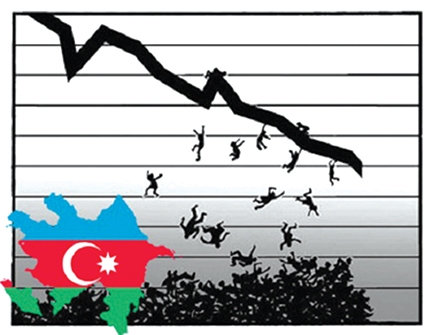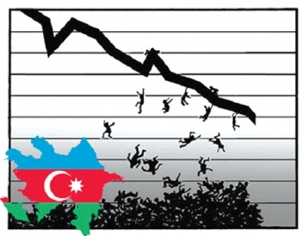Analyzing the Azerbaijan Crisis
Nikoloz Metreveli, member of the Young Scientists Council at the National Academy of Sciences of Georgia, spoke to GEORGIA TODAY to discuss the current situation in Azerbaijan.
You know Azerbaijan very well and lived and worked in Baku. What are the factors causing the economic crisis in Azerbaijan?
There are a number of factors causing the financial and economic crisis in Azerbaijan. Firstly, 63% of the budget is based on the oil-dollar agreement. Naturally, the lowest price on oil affected its budget. Secondly, it is a serious factor that the Azerbaijani National Bank did not calculate its future politics which was reflected in the fact that the National Bank, in order to maintain the high rate of the Manat, intensively spent its reserves in foreign exchange. At this time, if the National Bank continues the same pace of consumption of foreign currency reserves, as it has been doing for the past eight months, it will have only five more months to empty its currency reserve. To date, the Manat is depressed by 102%.
Economic crises always have negative social and political effects. In this regard, what is the situation in our neighboring country?
Azerbaijani society is clearly disproportionate, with a distinct difference to be found between the incomes of the ruling elite and that of the remaining households. Azerbaijani authorities still use the so-called social pillow, which allows vulnerable people, including a million IDPs, to earn normal wages for living.
For obvious reasons the resources of the Azerbaijani government have dramatically reduced. A further important aspect to be considered is the fact that about two million Azerbaijanis live and work in Russia who then transfer funds to Azerbaijan, which is very important for the stabilization of the social environment.
The economic crisis in Russia itself has an impact not only on Azerbaijani people living there but on those families that are significantly dependent on their relatives through money transfers.
The corruption of the so-called elite is also a serious problem in the government of Azerbaijan. If these conditions were bearable during the stable economic situation, now the conflict in society is deepening.
How dangerous is the economic and social crisis in the Azerbaijan republic?
Unfortunately, the signs of social and political cataclysms in Azerbaijan are already evident. Protests have taken place in a number of cities, including Baku. It is impossible not to agree with the authoritative American analytical center Stratfor’s (https://www.stratfor.com/) forecast that if the oil price is not stabilized, the economy of Azerbaijan will experience ever deeper problems.
How will the situation in Azerbaijan affect Georgia and the region as a whole?
Azerbaijan is a very important country in our region, and it presents a point of interest of powerful states and regional leaders. This country is our strategic partner and ally. Accordingly, Georgia should be highly interested in the fact that next to it is a stable and prosperous country. The importance of Azerbaijan for its energy supplies and transport communications is clear for Russia, the US and the European Union. In addition, there is Iran. Various reports say that from 16 up to 25 million ethnic Azerbaijanis live in Iran. At the same time both countrie’s population follows Shia Islam. What’s more, Turkey will not be able to stand by and watch the crisis taking place in Azerbaijan- especially considering their joint slogan: “two countries, one nation”. Finally, there is constant fear that Armenia will try to use the current situation in Azerbaijan for its own gains.
Dimitri Dolaberidze











